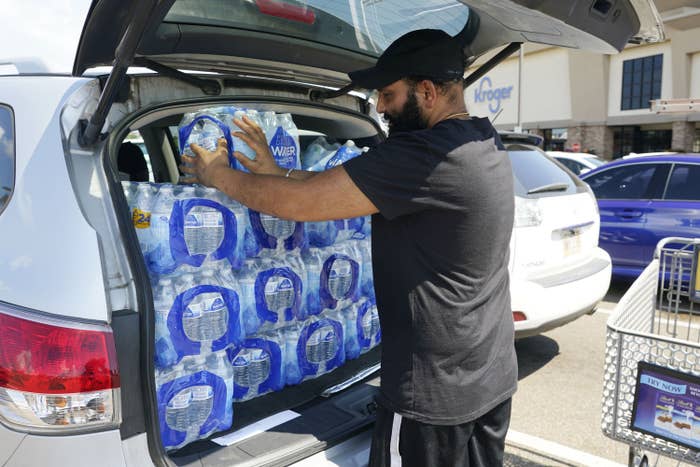
Mississippi's capital was struggling to keep the water flowing to more than 150,000 people on Tuesday after floods deepened ongoing problems with the city's aging water system.
Mississippi and the city of Jackson have declared emergencies as they work to distribute water to residents and restore water pressure across the capital city. On Monday night, Gov. Tate Reeves announced that the city's main water treatment facility had started to fail, and it was unclear when it would be fully operational again. Residents had already been told not to drink from their taps without first boiling it, but now they can’t even reliably access the potentially contaminated water.
"Until it is fixed, it means we do not have reliable running water at scale," Reeves said during a press conference. "It means the city cannot produce enough water to fight fires, to reliably flush toilets, and to meet other critical needs."
On Tuesday evening, Reeves said the state has asked President Joe Biden for an emergency declaration so it could receive federal assistance to address the crisis.
The current shortage is just the latest challenge that Jackson, the capital of the poorest, Blackest state in the nation, has faced amid a yearslong water crisis. Due to how old the water infrastructure is, the city's roughly 150,000 residents, 82.5% of whom are Black, have grown accustomed to having to boil what comes out of the faucet and gone weeks without safe, reliable water in their homes.
"To live in Jackson constantly is to be under the threat of a boil-water alert," Joshua Dedmond, operations director for Cooperation Jackson, an organization that works to democratize the economy and empower the Black community, told BuzzFeed News.
Dedmond said that while his family still has some water pressure, they have had to buy more cases of water and take fewer showers as a result of the shortage.
"We have friends personally whose family have not had water for the past week," he said.
Cassandra Welchin, executive director of the Mississippi's Black Women's Roundtable, said in a statement provided to BuzzFeed News that the water crisis "magnifies the challenges of already struggling families."
"Through this hardship, Jackson citizens are being deprived of the simple necessity of clean clothes, safe drinking water, and proper bathing to a mostly Black population and/or people of color," Welchin said.
Before state officials stepped in this week to help distribute supplies and make emergency repairs at the O.B. Curtis water plant, residents were already under a boil-water notice. Jackson Mayor Chokwe Antar Lumumba said the latest issue was caused by the flooding of the Pearl River, which forced workers at the city's main water plant to adjust their treatment processes, leaving many residents with no or low water pressure.
"Due to the flood, they were receiving a different composition of water, a different makeup of water that made it more difficult to treat," Lumumba said during a Tuesday afternoon press conference. "If they didn't change the chemical composition of how they were treating it, then we would have left our residents in greater danger. ... And so that's why they were unable to push out more water."
The O.B. Curtis facility is supposed to provide 50 million gallons of water each day, but because of ongoing issues its maximum capacity is currently 43 gallons, according to state officials. On Tuesday, the plant produced just 30 million gallons of water, said Jim Craig, director of health protection for the Mississippi Department of Health.
Lumumba said the city has already been able to restore water pressure for some residents who had nothing flowing through their pipes on Monday and that they were continuing to increase production "each and every moment."
Speaking to reporters, the mayor emphasized that while he is grateful for the governor's support and the recent emergency declaration, the city is and has been in "a constant state of emergency."
"We've been going it alone for the better part of two years when it comes to the Jackson water crisis," Lumumba said. "I have said on multiple occasions that it's not a matter of if our system would fail, but a matter of when our system would fail."
Lumumba said the city has committed millions of dollars toward repairs to its system, including hardening equipment against freezing temperatures after winter storms knocked out power and water across the Southeast last year and left most Jackson residents without safe, reliable water for more than a month.
Officials have previously estimated that it would cost around $2 billion to revitalize its water infrastructure following decades of deferred maintenance — a price tag well beyond what the city and its taxpayers can afford. Decades of white flight have deteriorated the city's tax base and the state has historically refused to help shoulder much of the costs. But with the emergency declaration this week, Reeves said the state would split the costs of the improvements it makes with the city 50/50.
"We will do everything in our power to restore water pressure and get water flowing back to the people of Jackson," the governor said.
In the meantime, Jackson public schools have shifted to remote learning due to a lack of adequate water in their buildings, and students at Jackson State University are relying on portable showers and toilets.
"This is definitely [having] a real impact on people day-to-day and on their health, their welfare, their ability to go to work and provide for themselves," Dedmond said.
He blamed the ongoing crisis in Jackson on institutionalized racism, saying that for years, the state has deprived the Black-majority city of support.
"The struggle around water, which is crucial to our lives, should not be placed in this vestige of hatred and this vestige of power or the lack of power," Dedmond said.
